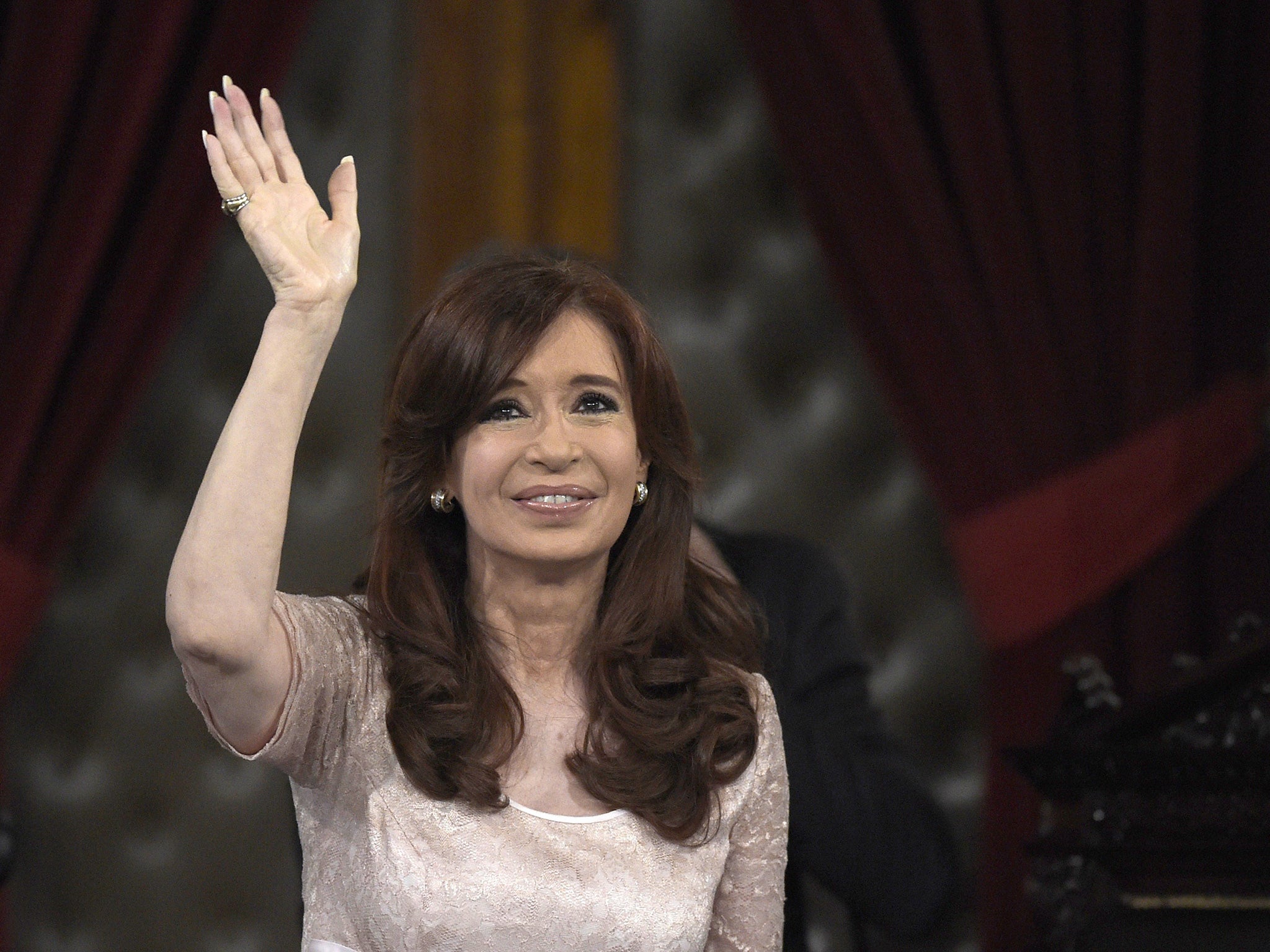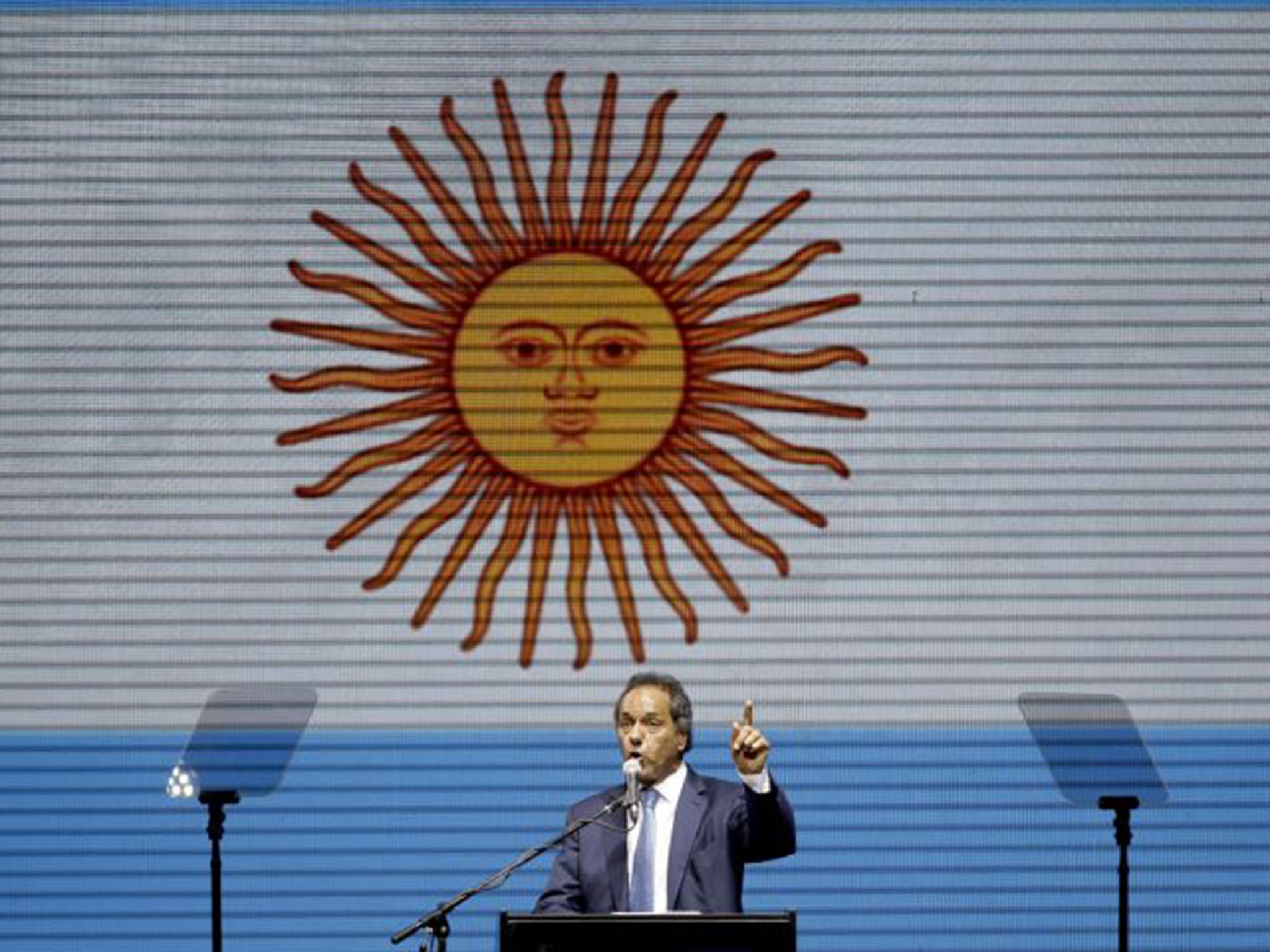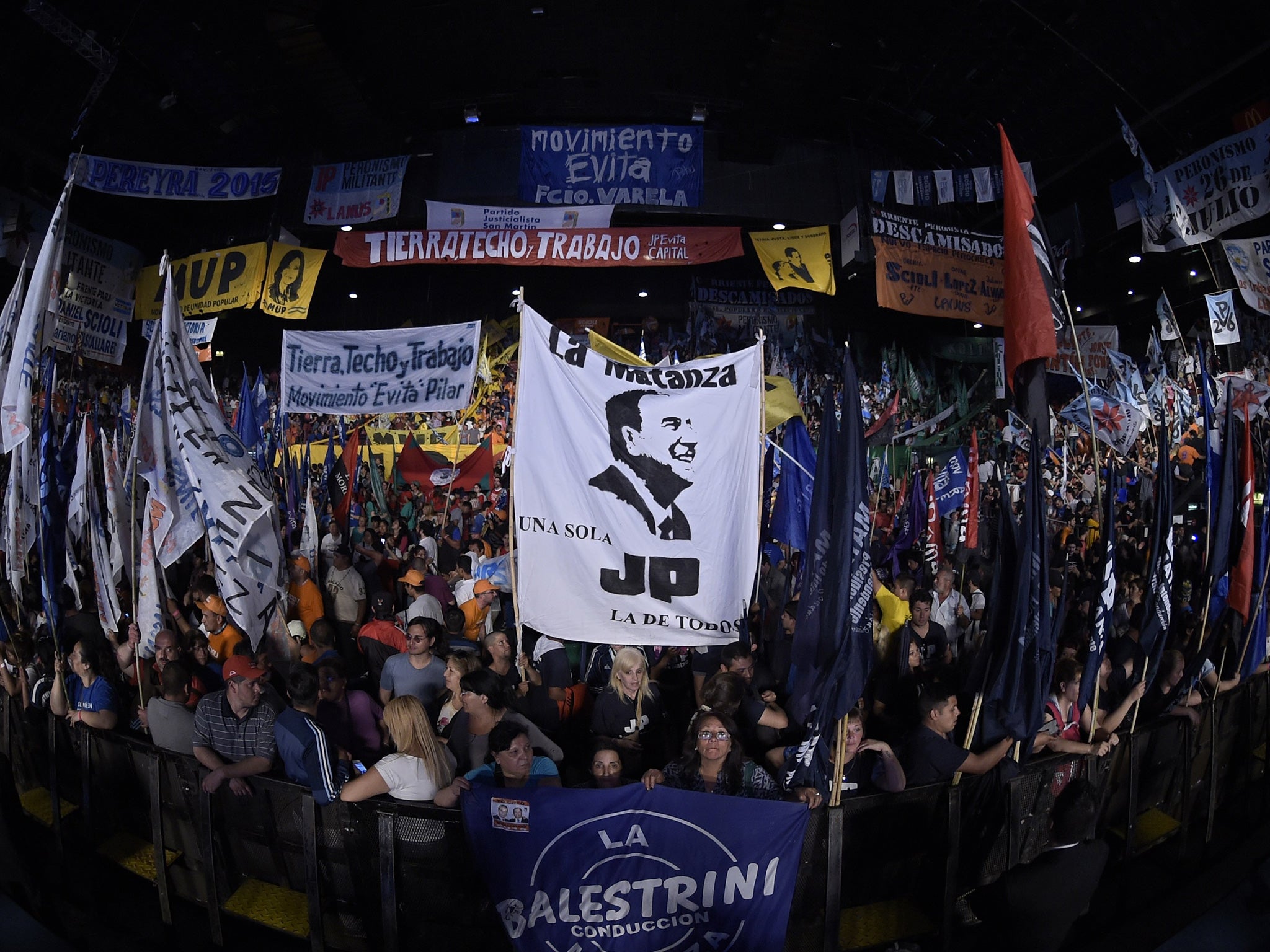Argentina election: As her tenure comes to an end, what legacy has been left by President Cristina Fernandez de Kirchner?
Viewed by her critics as quirky verging on unhinged, the outgoing president divides opinion and leaves her country more isolated than ever

In the slick studios of the pro-government C5N channel, the mood is one of giddy confidence. Its top anchor, Gustavo Sylvestre, is ticking off the triumphs of the outgoing president, Cristina Fernandez de Kirchner, when he sees a tall figure approaching. “Meet the brother of the next president,” he beams.
As Argentina prepares to bid farewell to Ms Kirchner, whose sometimes stormy eight years in office have been marked by calculated confrontation with Britain over the Falkland Islands, with the United States and especially with a group of hedge funds to whom she has refused to pay outstanding debt, her admirers – Mr Sylvestre perhaps first among them – can almost taste vindication.
Whether that comes on Sunday, when the country votes for a new president – Ms Kirchner, who was elected in 2007 after her now deceased husband, Nestor Kirchner, served for the preceding four years cannot run again – remains to be seen. Her chosen successor and the main standard-bearer for the still dominant Peronist movement here, Daniel Scioli – whose brother is the one to appear on the studio floor – seems certain to get the most votes. But to avoid a November run-off, he must emerge with at least 40 per cent and be at least 10 points ahead of his nearest challenger.
Among the final opinion polls of a noisy campaign, one, by Management & Fit, saw Mr Scioli, the 58-year-old Governor of Buenos Aires province, drawing 38 per cent, with his closest rival, Buenos Aires’s market-friendly Mayor Mauricio Macri, in second place with 29 per cent and Sergio Massa, a dissident Peronist who was a close Kirchner lieutenant before he broke with her, trailing at 21 per cent.
But in the studio, where only a Scioli administration will do, Jose ‘Pepe’ Scioli brushes off the suggestion that his brother, whom he advises, may be bumped into a potentially perilous second round, which would see the forces of the opposition united behind just one candidate, presumably Mr Macri. “It will be 42 per cent to 29 per cent,” he assures The Independent. “Are we taking bets on it?”

Viewed by her critics as quirky verging on unhinged – Hillary Clinton is known to have openly inquired about her mental health – Ms Fernandez will leave a legacy open to conflicting interpretation. Argentina has suffered a sharp deterioration of its economy, especially over the last four years, and the imposition of currency controls, the seizure of private assets, including the national airline, the main oil company YPF, and a second default on debt owed to the funds, have left the country more isolated than ever.
“She is by no means crazy, she is, rather, a big political militant who has had a consistent, coherent vision throughout her career,” says Sylvestre, one of only three journalists to have interviewed her over the last two years. She has been branded such, including by some inside the country, he says, because she has had the guts to “stand up to the opposition and the big corporations” and because some of her policies, notably her currency controls, have inconvenienced the country’s wealthy class.
Carlos Fara, a political consultant, agrees that her high approval rating as she leaves office, at about 54 per cent, are not as confounding as they might appear. “It’s the result of various milestones meeting popular demand: her advancing of human rights, the recovery of Aerolineas Argentinas and YPF… the nationalization of the pension funds,” he notes, also listing new per-child government payments to families, the passing of gay marriage and progress against corruption.

Yet, it is the generosity of Ms Kirchner’s social welfare programmes and the extraordinary expansion of the public sector – the state now accounts for a staggering 40 per cent of the economy – that also accounts for a crippling seven per cent budget deficit (she inherited a four per cent surplus from her husband), inflation at about 25 per cent and a burgeoning exchange crisis that may quickly force whoever replaces her into an early and dramatic devaluation of the peso against the dollar. She has maintained the state’s generosity only by printing money, itself fuelling faster inflation.
“It is not sustainable,” asserts Sebastian Auguste, a professor of economics at Torcuato Di Tella University here. “The new government cannot carry on with this, they have to change this very, very fast. I hope that people will recognise eventually that she (Ms Kirchner) was a disaster. People take time sometimes to understand, but the reality will always emerge.”
She is by no means crazy, she is, rather, a big political militant who has had a consistent, coherent vision throughout her career
Professor Auguste warns that Argentina, unless big changes are made, is on its way to becoming like Venezuela, also a once-rich country in the region that is now in an economic tailspin. “People don’t see what is happening – that we are eating the pie of our kids. That is what happens when you are spending more than you have, you are spending the income of your future generations.”
Mr Scioli, who lost an arm speedboat racing when he was younger, has campaigned by saying as little as possible about what he will do as president beyond platitudes about continuity. “I come to offer the Argentine people confidence and peace of mind,” he offered blandly at the final campaign rally at a rock concert venue, Luna Park, in this city on Thursday night before a raucous crowd. He paid tribute to Ms Kirchner for leaving “a country more ordered, less in debt and with more sovereignty”.
His pitch leaves some ecstatic, some less so. “It is not who I will vote for, it’s who I will never vote for,” Nestor Baido, 43, a small business owner, said, snarling the name Scioli. “We have had enough. Argentina needs change from Kirchnerism.” But Monica Valany, 48, who attended Mr Scioli’s Luna Park rally, is convinced. “He is a wonderful person and would be a wonderful president,” she declared. “We need a man like Scioli.” A tax accountant, she brushes off the notion of a pending economic Armageddon. “Every country has its economic problems, Argentina does too.”
But while the features of Ms Valany soften visibly when talking about Ms Kirchner – “All Argentines love her” – she concedes that Mr Scioli should take steps to end Argentina’s international isolation. “He will repair relations with Britain and the United States and open markets.”
This has been the tightrope for Mr Scioli, an uninspiring orator who leaves his governorship with a mixed record. He is under pressure from Kirchner loyalists to commit to hewing the same policy course, but he will also need to avoid being seen as her puppet, merely keeping her bed at the Casa Rosada, the presidential place, warm for 2019 when she will be able to run for another term.
“He will try to be a new leader,” Mr Fara predicted. “He does not have a confrontational style and any changes in direction will not be radical, but he will gradually be tuning in to some demands for change. In economic terms it will be change forced by circumstance. And you will see it in foreign policy too.” Among his first steps is likely to be a new attempt to reach a negotiated settlement with the hedge funds, which would end the country’s current pariah status and reopen the door to seeking new foreign loans.
At C5N, the transition of loyalty from Ms Kirchner to Mr Scioli, is clearly already well under way if his brother and top advisor loitering in its studio is any indication. But Mr Sylvestre, the anchor, still has some work to do to summon the kind of enthusiasm – perhaps adoration – for Mr Scioli that he has for the president he aims to replace.
“No one is a leader like her,” he says wistfully. “Not Macri, not Massa. Not Scioli.”
Join our commenting forum
Join thought-provoking conversations, follow other Independent readers and see their replies
Comments